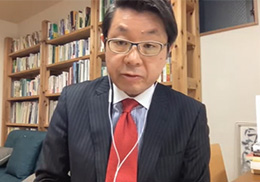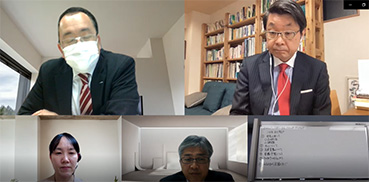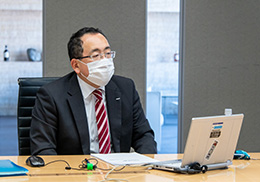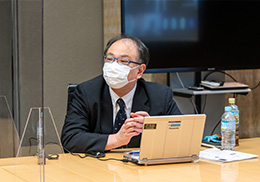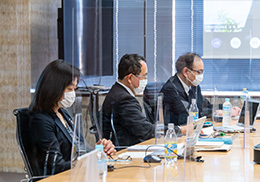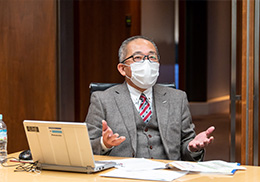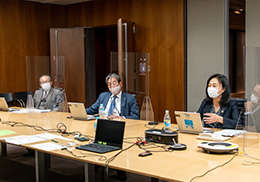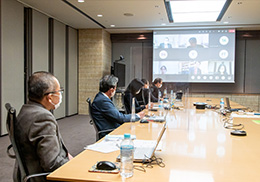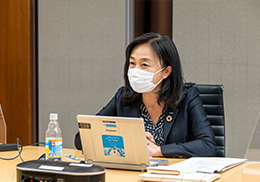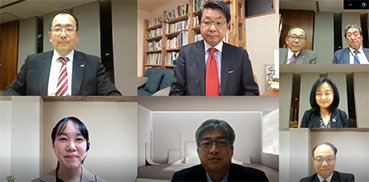Based on its vision of "Growing for Good," the Suntory Group formulated the Suntory Group Sustainability Vision in 2019 to support its continuous efforts toward the realization of a sustainable society. We shared our recent initiatives on "Water," "CO2," and "Containers and packaging"—three of the seven key sustainability themes laid out in that vision—during a stakeholder dialogue with experts in order to gain their insights and feedback.
-
● Date:Thursday, January 14, 2021
-
● Location:Experts: Remote-based participation
Participants from Suntory: Suntory World Headquarters (Odaiba Office)
Experts
-

Naoki Adachi
CEO, Response Ability, Inc. -

Yukiko Hirabayashi
Professor, Department of Civil Engineering, Shibaura Institute of Technology -

Jiro Furuki
Research Director, Environmental Innovation Group, Environment and Energy Division, Mitsubishi Research Institute, Inc.
Suntory
-

Tomomi Fukumoto
Executive Officer, Suntory Holdings Limited
Senior General Manager, Corporate Sustainability Division -
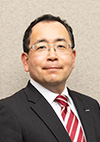
Nobuyasu Kitamura
Suntory Holdings Limited
Senior General Manager, Corporate Sustainability Department, Corporate Sustainability Division -

Hiroshi Naito
Suntory Holdings Limited
Senior General Manager, Corporate Sustainability Department, Corporate Sustainability Division -
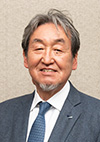
Masao Itoko
Senior Executive Officer, Suntory Beverage & Food Limited Senior General Manager, MONOZUKURI Division -
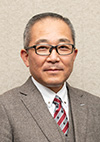
Tsunehiko Yokoi
Executive Officer, Suntory MONOZUKURI Expert Limited
Senior General Manager, Packaging Material Development Department, Supply Chain Management Division
Moderator
Hidenori Imazu
Program Committee Member, Japan Forum of Business and Society
Emphasizing an Image of Having Leadership in Both Water and Environmental Sustainability
- Moderator
- Today, we would like to hear the opinions from the experts regarding three of the key themes laid out in the Suntory Group’s Sustainability Vision: water, CO2 emissions reduction, climate change, and containers and packaging (with a particular focus on plastics). To get started, please give us your opinions about the Suntory Group's water sustainability initiatives.
- Adachi
- Suntory has been consistently and enthusiastically engaging in water sustainability, and those efforts have a direct link to their core business. This, I think, is very impressive in terms of the message that it is sending out to society. With regard to water resource conservation in Japan, I am very impressed by Suntory’s cultivation of twice the amount of water as used in their plants in the forest areas which serve as their water resources; this effort could well be called “water positive.” In addition, I think it is also very commendable that Suntory is continuing its Suntory Mizuiku-Education Program for Nature and Water, including its Outdoor School of Forest and Water and Teaching about Water at Schools activities even during the COVID-19 pandemic. On the other hand, I would like to know more about initiatives that the Suntory Group is taking other than water resource conservation in Japan. I am interested in what types of initiatives the company is taking regarding water used in farming for raw ingredient production.
- Hirabayashi
- We professionals have been working hard on water education, so I think it is wonderful that a company like Suntory is taking the initiative to promote this education and really appreciate the company's efforts.
I also appreciate the fact that the activities are not just based on impressions and concepts but based on scientific research and evaluation in the field as well, and that they not only obtain scientific knowledge from it but also communicate their findings well. Through continuous research, we may, for example, already be able to see the effects of environmental and climate change as well as population growth, not only in Japan but also overseas. I think it would be even better if, in addition to their current communications, Suntory could show how it will respond to such changes and promote activities that lead to a long-term vision, such as continuous monitoring.
With regard to water stress (a condition in which the amount of water available per person per year is less than 1,700 tons, causing inconvenience in daily life), Suntory selected from their many plants those which were evaluated as high risk to serve as the targets of their current evaluations. However, there is a possibility that locations that are not currently selected as target sites may be under a certain level of water stress in the future, such as in 2030 or 2050. Through observation, I hope that Suntory will be able to make timely determinations of locations that are expected to be at a higher risk for increased water stress level in the future.
- Furuki
- The topic that first came to my mind regarding water initiatives is water use reduction. In addition, I think it is wonderful that Suntory is taking initiative to cultivate water resources and engages in initiatives that are rooted in local communities. I think it would be even better if there were quantifiable indicators for these initiatives as well. Since there is currently a trend in localized SDGs and regional circular and ecological spheres, I think Suntory could take a leadership role in these activities in each region.
- Kitamura
- We are making various efforts to become a leader in the field of water sustainability. However, the title of frontrunner can be defined in various ways. Although I don't think there are any absolute requirements, what do you expect to see from Suntory as a company regarding water sustainability initiatives, or what initiatives do you think are essential?
- Hirabayashi
- On a personal note, I have been buying Suntory Minami-Alps Tennensui in bulk every month since the Great East Japan Earthquake in 2011. As a professional involved in water cycle research, I should make scientific judgments regardless of the brand. As a mother of a child, however, I want to make sure that the water is safe and reliable. Even if there is a mineral water product that is a few yen cheaper , I will not choose it. I believe that this feeling comes from Suntory's corporate image.
However, I feel that consumers are not yet aware that while Suntory is a leader in water sustainability, it is also a leader in environmental sustainability. In fact, the company is making many efforts such as contributing to decarbonization and the creation of a recycling-oriented society, so I think it needs to further convey the image that it is both a leader in water sustainability and environmental sustainability. This will lead consumers to believe that they will be doing something good for the environment if they buy Suntory products.
- Adachi
- I also think that since Suntory is cultivating water resources on such a large scale, the company should be more proactive in promoting that it is working toward water neutrality, or that it is already water positive. These things will not be conveyed unless the company actively tries to communicate them. I would also like to see these advanced initiatives promoted not only in Japan but also overseas as Suntory’s overseas business is large, and has employees of various nationalities around the world.
With regard to water sustainability, I feel that Suntory is doing everything it can to expand into education, but I think there is something missing in terms of initiatives. What kinds of solutions will Suntory provide for water shortages, which will undoubtedly become more serious in the future? There are hundreds of millions of people around the world who are in need of water, and unfortunately this number will increase as time goes on. What should the company do for people who are not necessarily Suntory customers? Global companies in any field are expected to help as many people as they can, not only their customers. Although the SDGs are perfect examples of how companies can contribute to the world, I believe that the real value of a company lies in how far it can go to help stakeholders who are not its customers.
Behavioral Changes Used as Suntory Branding
- Moderator
- Now I would like to move on to Suntory's CO2 emissions reduction and climate change initiatives. The Suntory Group has set the following targets toward 2030: A 25% reduction in direct emissions from its factories and business sites, and a 20% reduction in emissions across all value chains. In addition, the Environmental Vision toward 2050 aims to achieve net zero greenhouse gas emissions throughout the entire value chain.
- Adachi
- It will be very difficult to achieve zero greenhouse gas emissions in the entire value chain by 2050. However, I also wonder if striving for that is really enough. Last year, Japan declared that the entire country would be carbon neutral by 2050.
I am not saying that Suntory's goal is an easy one, but there are many industries where it is difficult to achieve this goal, such as the aviation, steel, concrete, and cement industries. When we think about achieving this goal for the entire country, is it sufficient for Suntory to be carbon neutral in 2050? Looking at the rest of the world, there are already alcoholic beverages and food products that claim to be carbon neutral, so I think Suntory needs to aim to achieve this goal a bit earlier.
- Hirabayashi
- Suntory has been selected for the CDP Water Security A List in the corporate survey on water resource management (conducted by the international non-governmental organization CDP to disclose information on corporate water security) for five consecutive years. This survey also includes an assessment of climate change risks, so I believe that an A rating means that the company is appropriately addressing climate change risks. However, the content of your presentation did not reveal much about climate change or water cycle risks. As global warming progresses, risks such as the risk of flooding and windstorms impacting the value chain are on the increase in Japan while some overseas plants are in regions experiencing more droughts.
- Naito
- Among our climate change measures, we are implementing mitigation measures (reducing emissions or increasing capture) in accordance with global guidelines for calculations and reporting with an aim to reduce Scope 1 (direct emissions), Scope 2 (indirect emissions), and Scope 3 (other indirect emissions). Since mitigation is our mission, we will engage in the continuous cycle of setting goals, determining action steps, and working out how best to implement those actions.
As for adaptation measures (mitigating negative impacts or increasing positive impacts), we are working to align with initiatives such as TCFD (Task Force on Climate-related Financial Disclosure) risk and opportunity assessment as tools, in order to improve the current tools and methodologies we already have. For example, we are taking basic measures such as providing products to society to prevent heat stroke, and we are also taking preventive measures such as installing raised charging facilities at our plants located along the sea to prevent flood damage.
- Hirabayashi
- The Intergovernmental Panel on Climate Change (IPCC) often discusses how to channel funds - companies need to pursue profits first, but climate change initiatives are partly taken out of their profits. This is where turning Suntory's environmentally conscious nature and changes in behavioral as a company into branding comes into play. There is a growing trend to promote this type of branding, which will ultimately lead to profits, as an essential part of corporate growth.
- Fukumoto
- As an adaptive measure, we have been working on risk management for natural disasters, including work from a BCP (Business Continuity Plan) perspective. However, what we need to take further action on in the future is the impact on ingredients in the mid- to long-term, and establishing a stable long-term procurement throughout the entire value chain. Although we focused on some raw ingredients in the past, now we are again discussing with each business unit about which ingredients are essential for their businesses, which raw materials are at high risk of being affected by climate change or water shortages, and which ones are irreplaceable. I think we need to start driving this forward, but if you have any advice, I would love to hear it.
- Adachi
- I heard from a food manufacturer in Japan that certain fruits, for example, are no longer available from their traditional sources. Climate change is already causing prices to rise and quality to deteriorate. I am worried that this is not something for the future but rather an immediate problem that needs to be addressed as soon as possible.
- Itoko
- For example, in the case of coffee, there is an issue called the "2050 Problem" where coffee can only be grown at higher altitudes than before due to the effects of global warming or there is a danger that it will become extinct. We currently have contracts with farms in Brazil and other countries to grow coffee and would like to tackle this issue by considering the risks of procurement and dealing with the water required for cultivation. A project on mid- to long-term procurement of coffee will be launched in January 2021 by the MONOZUKURI Division of Suntory Holdings for further study.
- Adachi
- I would like you to go ahead with this. This is the most important point for you to continue your business. It was explained that Suntory cannot do business without water, but it is not only water that is important. Since the company cannot remain in business without barley, coffee, or many other raw ingredients, I really hope that you will put more effort into raw ingredient sustainability.
- Moderator
- I would like to hear Mr. Adachi's opinion on what specific measures should be taken to reduce CO2 emissions.
- Adachi
- I think Suntory is already doing a good job of saving energy. Additional alternatives include introducing renewable energy by being able to purchase it in a stable and economically reasonable manner by signing a long-term PPA (Power Purchase Agreement: Electricity Sales Contract Model). On the other hand, renewable energy is difficult to purchase in Japan and is expensive. This is an area where the government needs to work harder, but I think it would be good for like-minded companies to work together to find ways for companies to influence the government.
- Kitamura
- Our vision is growth, and from the standpoint of a business, there is a dilemma between growth and reducing CO2 emissions. I feel that it is difficult for any company to realize these two goals.
- Adachi
- Even as a business grows, it can still reduce its CO2 emissions. This is because if it shifts to renewable energy, it will no longer have to think about the issue. Even if the company's energy consumption goes up, it will not be a concern because renewable energy does not emit CO2 in the first place. Another approach is called regenerative agriculture. Large farmers and grain manufacturers in the U.S. have taken notice of regenerative agriculture and are now rapidly making a shifting toward it. Instead of traditional intensive agriculture that depends heavily on fertilizers and pesticides, they are reverting to a method which is as natural as possible called natural farming in Japan. It is said that agriculture emits 25% of the world's GHG (greenhouse gas) emissions. In natural farming, the soil absorbs a lot of CO2, and the entire value chain can considerable reduce the amount of CO2 generated. I think this is an approach that could be very useful.
Using Materials that Do Not Limit the Functionality of PET Bottles
- Moderator
- Based on its Plastic Policy, the Suntory Group aims to switch all the PET bottles used globally for Suntory products to be made of recycled or plant-based material by 2030, achieving zero use of virgin petroleum-based materials. Please share with us your opinions regarding plastic.
- Adachi
- I think highly of the goals for 2030. I think that many domestic companies end up with a sense for domestic market sentiment or domestic benchmarks and stop there. However, Suntory's goals are in line with the sensibilities of the international market.
- Furuki
- I believe that Suntory has set the highest goal for plastic among the major bottlers in Japan. In addition, I think it is very good that Suntory has formed an alliance across the industry (the establishment of a new company R Plus Japan Ltd. to work on the recycling of used plastics) rather than working on the issue alone. On the other hand, when we think about how to achieve this goal with a mind toward sustainability, we need to consider the balance between recycled materials and plant-derived materials as the hurdle to achieving carbon neutrality in CO2 emissions is becoming higher.
- Yokoi
- As Mr. Furuki mentioned, at this stage we need to hold various cards in our hand to know what the future holds. For example, although we have been working on bottle-to-bottle mechanical recycling technology since 2011, there is the issue of whether we can collect enough used PET bottles to serve as raw materials. Therefore, we are trying various approaches such as chemical recycling and the use of natural bioplastic materials to expand the scope of our business. All these approaches are still being explored, but if we stop, there will be no cards left to play, so we are determined to keep pushing forward.
- Furuki
- When I talk to people in the industry, they say that PET bottles have excellent functions that cannot be replaced by any other type of bottle, and that their current form is the result of consumer choice. Therefore, as to whether Suntory should continue to do business only with PET bottles in the future, the company should not simply substitute materials but also consider a system for selling beverages without compromising the functions of PET bottles to some extent. I think it would be better to consider such a business approach.
- Yokoi
- In 2019, we commercialized a 190 gram can made for storing concentrated oolong tea and barley tea to replace the two-liter plastic bottle versions of those tea products. I think this is one of the measures for responding to the issue that you have indicated.
- Itoko
- These cans for concentrated beverages are made of steel, so they are not only easy to recycle but are also logistically friendly. Since there is currently a shortage of drivers in the logistics industry in Japan, there is a need to reduce shipment volumes while maintaining sales. In the future, although our soft drink business will not use PET bottles for everything, I believe that one of the ways to reduce logistics volumes while maintaining sales is to deliver the same delicious products to our customers' homes at a certain cost.
- Adachi
- Although not plastic, there are attempts to use paper containers for wine and whisky overseas. I believe that neither container is in its final form but are still in the trial-and-error development stage. I am sure that through this process of trial-and-error something new and really good will be created and experience gained.
- Furuki
- There is still no clear solution to this problem in the world. To be honest, I think it is difficult to say at this stage that this is the best solution because there are many places that are backcasting and setting ambitious goals for the future. Therefore, in my opinion, the final decision must be made based on the thoughts of people in charge and whether the environment is conducive to realizing the future that those people have in mind.
- Fukumoto
- The search for alternative materials is one of the measures set forth in the Plastic Policy. The difficulty is that when considering alternative materials, it is necessary to consider not only the issue of marine pollution, but also other environmental and social issues such as climate change throughout the life cycle. As you mentioned, we cannot yet identify a specific solution, but we will continue to make choices and decisions while making comprehensive judgments without eliminating all options.
Enhancing Corporate Value Through Communicating to the World
- Moderator
- You have provided much advice. In closing, do you have any last words of advice and encouragement to Suntory regarding an area where you would like them to work harder and strengthen their efforts?
- Hirabayashi
- Mr. Kitamura talked about the dilemma between CO2 reduction and business growth. I think it is important for companies not to see this as a dilemma but rather to think that CO2 reduction is positive for business development and to promote business in a well-balanced manner, which will lead to lower risk for the company. I hope that you will proceed with your efforts with the confidence that you are contributing to the development of a better society, a better Japan, and a better world in the future.
- Furuki
- I would like to address two things. The first is plastic. In addition to plastic bottles, materials such as polystyrene are also looked down upon globally. However, Japan has established a collection and recycling system for such materials and has achieved a high collection and recycling rate. I believe that Suntory can play a role in communicating such efforts. The second thing I would like to address is that it will be very important to communicate Suntory's vision for the future, such as its future alliances and long-term vision, to the world.
- Adachi
- If there is a sustainability field that I would like to see Suntory expand in, it is of course water. Although Suntory is already involved in various water sustainability initiatives, I think the company also needs to think about, as a last resort, what kind of solutions it can provide to people who are in need of water.
Lastly, I would like to add one more hint that it would be good to focus on this area. The COP15 of the Convention on Biological Diversity will be held in 2021, and the goals for 2030 will be set. In 2021, the COP15 of the Convention on Biological Diversity will be held, and a target for 2030 will be set, and business leaders are saying that the target should be quite ambitious. Just as the Paris Agreement changed the course of climate change, this could be the start of a new forward effort, so I would like you to pay attention to this.
- Fukumoto
- I would like to make two remarks to summarize what I have learned from the opinions of the experts here today.
First of all, I would like to reiterate that we need to consider both positive and negative impacts of sustainability as a management and business strategy. Rather than accepting climate change measures as a dilemma, I would like to share within the company the perspective of how to reduce risks and transform them into opportunities, and how to align the vector with the business to make it a driving force.
Secondly, the experts' expectations for Suntory deeply resonated with me. Regarding water in particular, as the source of our business, we have been promoting it based on our philosophy. However, I took this to mean that we should respond not only to our own customers but also to society as a whole, considering all members of society as our stakeholders. It also means that we should communicate to the world what Japan is like and its unique strengths. I am aware of the problem that the world of sustainability is dominated by the West and that it tends to follow Western-led rules that do not reflect the reality in Japan and the rest of Asia. I think their expectation is that Suntory will be able to fill the gap by providing information from Japan and the rest of Asia. As for future initiatives, I would like to gain another perspective and think about what role we should play in the world. Thank you very much for your time today.
